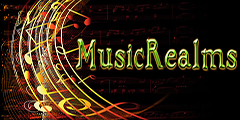LE POISSON ROUGE
Celebrating A Decade Of Music With An Eye To The Future
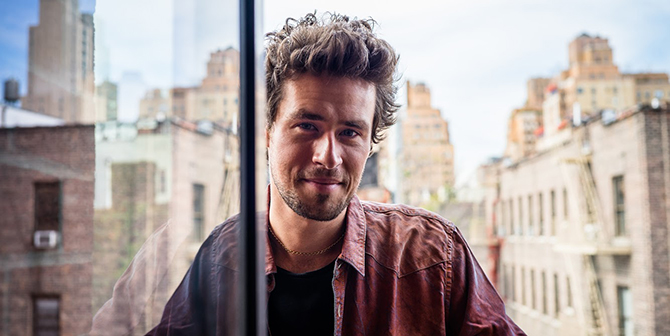 David Handler Photo by Quinn Ryan Mattingly
David Handler Photo by Quinn Ryan MattinglyBy Bailey Beckett
It’s been 10 years since owner David Handler opened Le Poisson Rouge, a Village nightclub that brings under-the-radar classical and jazz talents to the New York stage. And yet rather than bask in the memories, the musical impresario is looking onward. Handler announced this summer he’s stepping back from day-to-day management of the venue, which the New York Times called a “forward-thinking venue that seeks to showcase disparate music styles under one roof,” to concentrate on writing and performing music rather than booking it.
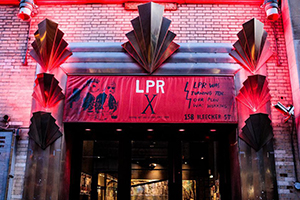
His first project will be a collaboration with Jónsi and Alex Somers, of the group Sigur Ros, where he is going to rework and write their 2009 album Riceboy Sleeps. Handler, who is also a classically trained violinist (he graduated from the Manhattan School of Music) is also simultaneously making a solo album of his own. The news of Handler’s new role has not gone unnoticed. Once called the “Ian Schrager of the music scene” by the New Yorker, he is synonymous with bringing an impeccable curation to the nightclub stage, having hosted talents as varied as Thom Yorke, Paul Simon, Yo-Yo Ma, Lady Gaga, Iggy Pop, Lorde, Beck and Philip Glass among many others. On the eve of his transition, Handler, who made Le Poisson Rouge the coolest place to listen to contemporary music, talks to New York Lifestyles about the decision and his plans for the future.
What would you say Le Poisson Rouge has meant to New York City since its opening?
I might be the person least capable of an objective answer, but I hope LPR has become a place that people count on, not only to hear the most exceptional and unique artists in their catalogue live, but also to be introduced to musicians and styles of music they’ve never known they love. Technology has enabled an exponentially higher output of music (via self-production, self-promo and self-distribution), making the role of curator all the more important to audiences at the same time as the live setting has justifiably gained greater value in a digital age. I believe deeply in the listener. If we’ve earned their trust—to deliver, challenge, and inspire—I consider it a mission accomplished. To do that, programming is as omnivorous and deliberately eclectic as possible, with no expense or attention spared on the audio-visual aspect of the experience, for both the performer and audience’s sake.
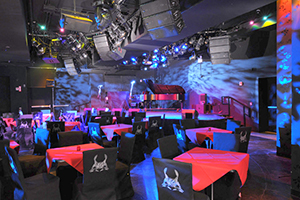
How has LPR fit into the city’s cultural landscape?
The fine art, music, theater, sports, food/drink—to say nothing of the programming offered without setting foot outside—is overwhelming. With media conglomerates absorbing independent venues/presenters left and right, I’d like to think ours is a more curated, nuanced approach to the calendar, and that we have become known as being a musician’s room; a room for the serious listener. We do this on hallowed ground, inhabiting the space that was once The Village Gate which hosted Hendrix, Morrison, Monk, Mingus, Warhol, Ginsburg, Velvet Underground, Ella Fitzgerald, and Belushi. Aretha Franklin gave her debut in the room, as did Peter Paul & Mary. I like to think we’ve carried the spirit of that eclecticism and independence with us. We’re proud to call the Village home and that we present shows in other rooms like the legendary Apollo Theater and Town Hall including unconventional spaces like cathedrals and warehouses on the regular. Our own orchestra, Ensemble LPR, makes an imprint beyond our four walls on Bleecker.
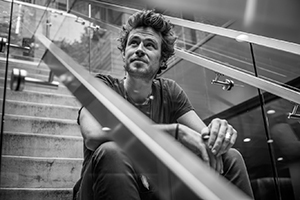 David Handler
David HandlerPhoto by Quinn Ryan Mattingly
How has it been stepping away to focus on your own artistic endeavors?
I’ve always thought of LPR as an expression of my musical being and output. Music has been the closest thing to a faith I have ever known. I began playing violin at age 3 and composing shortly thereafter. Unable to reconcile the huge chasm between the music I held so dear and that with which my peers where familiar, I began making playlists for friends, intent as a pre-teen on opening a nightclub that I had learned would resemble the “chambers” of the classical and romantic periods. I knew even then what I would name the place. In any case, LPR has always been a method of delivery. I’ve always been an artist first, and the return to my own music is about survival. In some ways opening a venue before focusing on one’s own career is backwards, but it was the only way I could feel right about the whole thing. Now I live the “Art Life” again, as David Lynch would say, and I am happy.
What has it been like working with Jónsi and Alex on the new orchestrations for the 10th anniversary tour of Riceboy Sleeps?
Collaborating with Alex and Jónsi (Sigur Rós) has been a deeply rewarding experience. We know each other, and they know my work. They gave me carte blanche to compose what I hear in the music and make it my own, knowing I understand the spirit of the piece and would honor it. They were sure I knew what the music needed and how the orchestra can provide it. The piece was given its world premiere at the Sydney Opera House on June 11th and was played a few more times in Australia since. I joined the tour for the Paris and London stops and will be there for most of the North America stops this fall.
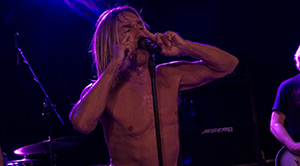 IGGY POP
IGGY POPYou also have an album of original compositions in the works. Is there a particular inspiration for this album?
The album is a series of portraits that map the everyday violence of inner life and the psyche. There are pieces for electronics, some for acoustic instruments, even some spoken word. I play nearly all instruments on nearly all tracks. It is an intensely personal album and safe to say it’s far from easy listening. This album is what my head sounds like. The engineer is Marc Urselli, who has worked a lot with John Zorn, Mike Patton, Lou Reed, etc. I’m exploring short film concepts to accompany the release.
After the tour and album, what’s next for you?
Music for screen maybe. I love film and I’m encouraged that lately the dialogue between sound and the moving image seems to be more dynamic and reciprocal than ever, in film and television. I love dance and am still trying to make peace with opera, so who knows. I like collaborating with the right popular artists and am certainly open to doing more of that. While pop music is of course alive and well, there seems to be a growing number of people who want more than to be amused or pacified by what they listen to. People are looking for art over entertainment; to transcend. These are my people. Some people are ready for music that challenges and provokes. I’m coming for you.
For more information on Le Poisson Rouge, visit lpr.com.
Contact David Handler at david-handler.com





